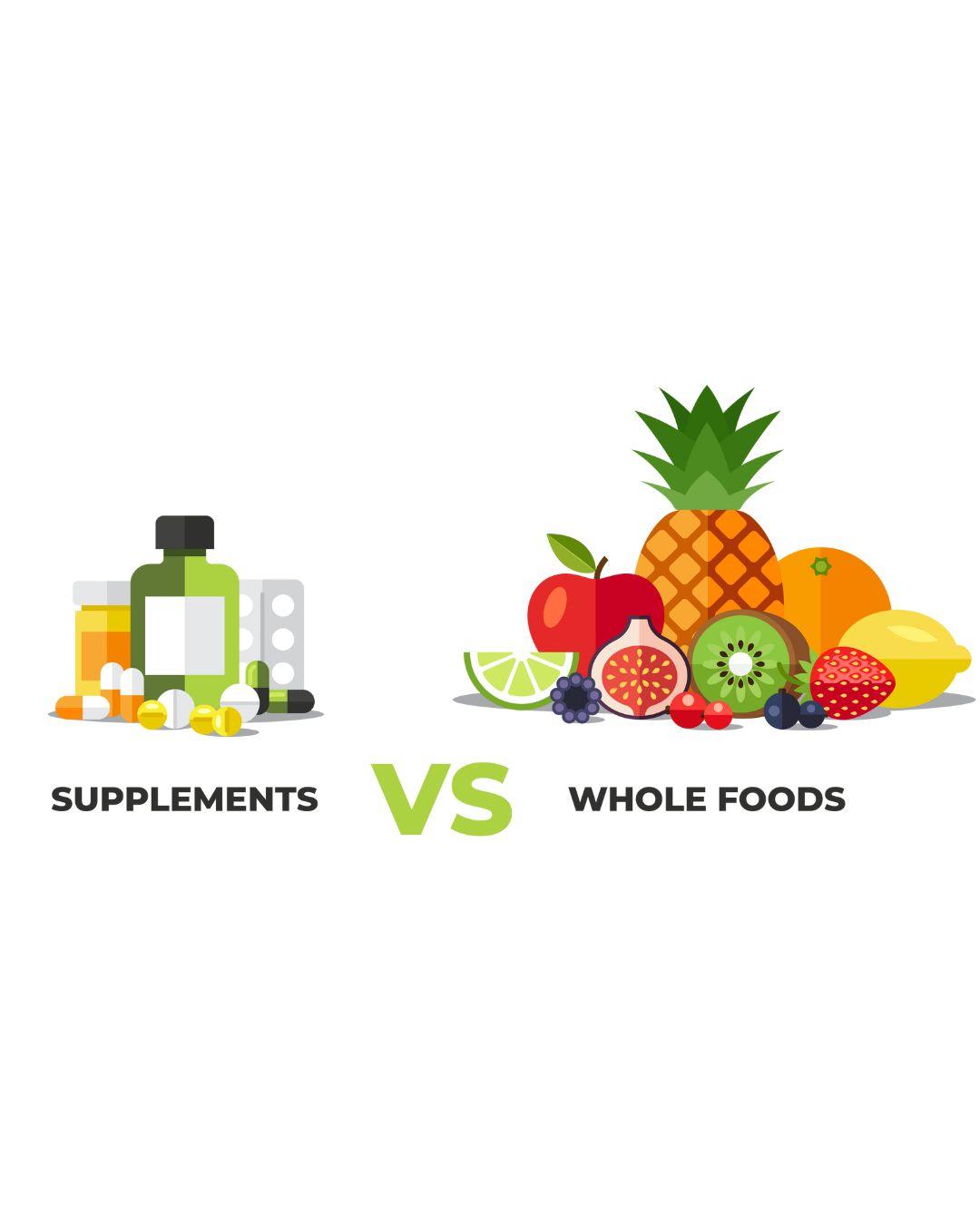In the age of fitness influencers, quick-fix diets, and supplement-stacked pantries, the question often arises: should supplements take priority over whole foods in your nutrition plan? With protein powders, multivitamins, mass gainers, and pre-workouts dominating the fitness industry, it’s easy to get swept up in the supplement culture. But before you load your cart with capsules and powders, it’s essential to understand how they compare to—and complement—real, whole food nutrition.
In this comprehensive guide, we’ll break down the roles of whole foods and supplements, the key differences between them, and how to prioritize each for optimal health and performance. By the end, you’ll have a clear, science-backed understanding of what should come first in your nutrition plan—and why.

The Foundation: Why Whole Foods Matter
1. Nutrient Density and Bioavailability
Whole foods—fruits, vegetables, whole grains, lean meats, legumes, dairy, nuts, and seeds—offer a rich spectrum of essential nutrients in a naturally balanced form. Unlike most supplements, whole foods provide:
-
Macronutrients: Carbohydrates, proteins, and fats in usable ratios
-
Micronutrients: Vitamins and minerals in bioavailable forms
-
Phytochemicals and Antioxidants: Compounds like flavonoids, carotenoids, and polyphenols, which play roles in disease prevention
-
Fiber: Crucial for gut health, blood sugar balance, and satiety
No supplement can fully replicate this complexity. While a capsule might provide vitamin C, it lacks the fiber, potassium, and flavonoids present in an orange—all of which work synergistically.
2. Hormonal and Metabolic Support
Whole foods influence hormones, metabolism, and inflammation in ways that isolated supplements cannot. For instance, omega-3s from fatty fish have a different impact compared to omega-3 capsules alone, due to the accompanying protein and selenium in the fish.
The Role of Supplements: Purpose-Driven Nutrition
Supplements are designed to do exactly what their name suggests—supplement an already well-structured diet. They are not meant to replace meals, but to fill in nutritional gaps, improve performance, or aid recovery.
When Supplements Are Necessary:
-
Deficiencies or Special Needs: If you’re deficient in iron, B12, vitamin D, or omega-3s, supplements can help restore optimal levels.
-
Intense Training and Muscle Growth: Athletes and bodybuilders often need higher protein intake or rapid post-workout nutrition, making whey protein powders an efficient choice.
-
Convenience and Consistency: Supplements can support nutrition when whole foods aren’t available—like during travel or hectic schedules.
-
Caloric Surplus for Hard Gainers: Mass gainers offer a practical way to consume additional calories and macronutrients for those who struggle with appetite or have very high caloric needs.
Key Differences: Whole Foods vs. Supplements
| Category | Whole Foods | Supplements |
|---|---|---|
| Nutrient Range | Broad spectrum of nutrients | Targeted, often single-nutrient |
| Bioavailability | Often higher due to co-factors | May vary based on formulation |
| Satiety | High (due to fiber and volume) | Low (especially in powders/liquids) |
| Processing | Minimally processed | Highly processed |
| Function | Prevent chronic disease, nourish | Fill gaps, enhance performance |
| Risk | Low when balanced | Overuse can lead to toxicity |
Common Scenarios: What Comes First?
Scenario 1: General Wellness and Health Maintenance
If your goal is long-term wellness, balanced energy levels, and disease prevention, whole foods should be your first line of defense. A colorful, varied, whole food diet rich in plant and animal sources offers unmatched support.
Supplements to Consider:
-
Vitamin D (if you lack sun exposure)
-
Omega-3s (if you don’t eat fatty fish)
-
Multivitamins (if dietary diversity is lacking)
Scenario 2: Building Muscle and Recovery
To build lean muscle mass, you need sufficient protein intake, usually ranging from 1.6 to 2.2 grams per kg of body weight. While whole food sources like chicken, fish, eggs, and legumes are ideal, it can be difficult to meet high targets with food alone—especially around workouts.
Supplement Priority:
-
Whey Protein: Fast-digesting and rich in BCAAs, ideal post-workout.
-
Casein: Slow-digesting, ideal before bed.
-
Creatine Monohydrate: Well-studied for strength and power.
Product Example:
Dymatize Elite 5lbs – Offers 25g of fast-absorbing protein per scoop with a complete amino acid profile, perfect for post-exercise recovery.
Scenario 3: Weight Gain and Bulking
For individuals struggling to gain weight or those in a bulking phase, consuming enough calories through food alone can be challenging. In such cases, mass gainers can be beneficial.
Supplement Priority:
-
Mass gainers with high calories, protein, and carbs
-
Whey protein to support muscle mass in caloric surplus
Product Example:
Immortal Hyperbolic Mass Gainer 6lbs – Offers over 900 calories and 54g of protein per serving, helping hard gainers reach their nutritional goals efficiently.
Misconceptions: What Supplements Can’t Do
-
Replace Meals Entirely: No supplement can replace the complexity and fullness of a real, balanced meal.
-
Make Up for a Poor Diet: Taking a multivitamin won’t offset a junk food-heavy diet.
-
Create Results Without Effort: Supplements work best when paired with proper training, rest, and nutrition.
-
Guarantee Safety Without Guidance: Overdosing on fat-soluble vitamins or stimulants can have harmful effects.

Creating a Balanced Nutrition Plan: Food First, Supplements Second
Here’s how to build a smart nutrition plan based on your goals:
Step 1: Assess Your Diet
Start by tracking your daily intake using apps or food diaries. Are you missing any key nutrients or food groups?
Step 2: Define Your Goals
-
Weight loss: Emphasize high-volume, low-calorie foods rich in fiber and protein.
-
Muscle gain: Prioritize caloric surplus and protein intake.
-
Endurance: Include complex carbs and healthy fats for sustained energy.
Step 3: Fill the Gaps with Smart Supplementation
Once your food intake is solid, consider adding supplements that directly support your goals.
Example for Protein Optimization:
Labrada Whey 4.4lbs – Provides 24g of clean whey protein, ideal for muscle maintenance and appetite control.
Example for High-Calorie Needs:
Muscled In Nutrition SizeUp Gainer 10lbs – A high-calorie gainer suitable for lean bulking or overcoming weight plateaus.
Practical Tips for Prioritizing Nutrition
-
Meal Prep: Ensure 80–90% of your calories come from whole food sources.
-
Supplement Timing: Use protein powders post-workout, multivitamins with breakfast, or mass gainers between meals.
-
Label Reading: Choose products with transparent ingredient lists, no banned substances, and tested purity.
-
Consult Professionals: A registered dietitian or certified nutritionist can help optimize your intake.
-
Stay Hydrated and Sleep Well: No supplement can replace poor sleep or dehydration—both essential for recovery and performance.
Conclusion: The Verdict
Food comes first—supplements come second. While supplements can significantly support your nutrition plan, especially in athletic and high-demand contexts, they should never replace the foundational benefits of real, whole foods.
Supplements are tools—not shortcuts. Used correctly, they can complement your diet, improve efficiency, and fill nutritional gaps. Used incorrectly, they can waste your money or even harm your health.
For a sustainable, performance-oriented approach to nutrition, build your base with high-quality whole foods and add supplements with purpose, not impulse.
Trusted Supplements from Anonutrition
Ready to optimize your plan with scientifically-formulated, high-quality supplements? Explore these handpicked options:
-
Dymatize Elite 5lbs – Elite performance whey protein
-
Labrada Whey 4.4lbs – Clean protein for daily muscle maintenance
-
One Science Nutrition Premium Whey 5lbs – Balanced whey with high bioavailability
-
Immortal Hyperbolic Mass Gainer 6lbs – Serious calorie and protein support
-
Muscled In Nutrition SizeUp Gainer 10lbs – Ideal for hard gainers and bulking plans
Choose wisely, eat purposefully, and supplement strategically.

